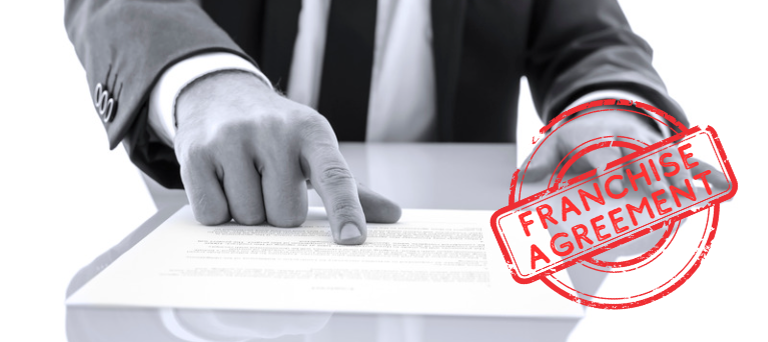If you’re researching franchise opportunities and considering actually buying a franchise, one of the most important documents you’ll need to review is the franchise agreement. This is a legally binding document. It outlines the terms and conditions of your relationship with the franchisor, and the extent of their control over your business.
In this article, we’ll explore some of the key legal terms and considerations you should be aware of before signing a franchise agreement.
What is a Franchise Agreement?
A franchise agreement is essentially a license from the franchisor that grants you the right to use their systems and intellectual property. This is in exchange for accepting some level of control over your business and paying fees.
It outlines the rights and responsibilities of both parties. It typically includes information on the franchisor’s trademarks, training and support services, ongoing fees, and length of the agreement.
Length of the Franchise Agreement
There is no right or wrong length for a franchise agreement. Even so, the length and complexity of the agreement should reflect the complexity of the franchise system an the amount of the initial investment.
The length of a typical franchise agreement will likely be at least 25 pages. However, agreements with more than 50 pages are common and some even exceed 80 pages.
The Rights and Obligations of the Parties
The franchise agreement outlines the rights and obligations of both the franchisor and the franchisee. According to the British Franchise Association (BFA) Code of Ethical Conduct, the essential minimum terms of the franchise agreement should include:
- The rights granted to the respective parties
- The goods and/or services to be provided to the individual franchisee
- The obligations of the franchisor and franchisee
- The terms of payment by the individual franchisee
- The duration of the agreement, which should be long enough to allow individual franchisees to amortize their initial investments
- The basis for any renewal of the agreement
- The terms upon which the franchised business may be sold or transferred and the franchisor’s possible pre-emption rights in this respect
- Provisions relevant to the use of distinctive signs, trade names, trade mark, service marks, store signs, logos or other intellectual property
- The franchisor’s right to adapt the franchise system to new or changed methods
- Provisions for termination of the agreement
- Provisions for surrendering promptly upon termination of the franchise agreement any tangible and intangible property belonging to the franchisor or other owner thereof
One-Sided
Franchise agreements are typically one-sided in favour of the franchisor. This is because it needs to have control over its franchisees to ensure its reputation and brand image are protected.
However, franchise owners who are members of the BFA have an obligation to comply with the BFA Code of Ethics. This requires compliance with certain standards within the franchise agreement. They are also required to deal fairly with the franchise owner.
Negotiating the Franchise Agreement
While the franchise agreement is generally non-negotiable, there remains some scope to negotiate key provisions such as territory exclusivity, aspects of training and transfer rules. This depends on how the franchise business model you’re looking at is structured.
However, it’s important not to give too much power to the franchisor, as this can lead to an unfair and imbalanced relationship and disputes.
Seeking Professional Advice
As a franchise agreement is a complex legal document it is important to fully understand its terms before signing. Therefore acquiring professional advice from a specialist franchise lawyer is highly recommended.

Look for an experienced franchise solicitor who is a member of the BFA or who has experience working with franchisees. In fact, seeking professional advice from a franchise solicitor is a requirement of the British Franchise Association (BFA) disclosure requirements.
Your solicitor can assist you in negotiating the terms of the franchise agreement with the franchisor. Furthermore, they can help you understand any areas of the agreement that may be unclear or ambiguous. They can also advise you on any potential risks or issues that may arise during the term of the franchising agreement.
In addition to a solicitor, you may also wish to seek advice from a specialist accountant. They can provide guidance on the financial aspects, such as the initial investment required, ongoing costs, and potential returns on investment.
Franchise Agreement – Key Terms
No matter what kind of Franchise agreement you have, there are some essential parts that every Franchise Agreement must have. These parts outline what is expected from all parties involved in the Franchise Agreement, and what exactly is involved with the business.
1. Definitions
This is where everything is outlined. Who the parties to the agreement are, and what intellectual property is involved, such as trademarks, copyright, trade dress, know-how, trade secrets, and anything else that might be considered intellectual property.
It will also state what is being used in that territory and how long it will be used there. This includes the date of commencement, the territory, the renewal, and the date of termination. This is the defining aspect of the Franchise Agreement.
2. Rights Granted
- The franchisor grants the prospective franchisee an exclusive/sole/non-exclusive license to operate the business within the territory from the premises.
- The franchisee is allowed to use the franchisor’s trade names, trademarks, copyright, material, know-how, knowledge, accounting management, and marketing experience.
- Not all franchise agreements grant exclusive territories.
- This section outlines the geographic area where you will be able to operate your business. It may be exclusive or non-exclusive and may include restrictions on the types of businesses you can operate nearby.
3. Franchise Fee
- The fee paid on the execution of the agreement for the right to use the franchisor’s brand, products, and services.
- It is typically paid upfront and varies depending on the type of franchise and level of support provided by the franchisor.
- There should not be a significant profit element in the initial fee. This is to prevent the franchisor from simply becoming a seller of franchises and benefiting from a high turnover of franchisees.
4. Duration/Franchise Term
- The length of time the franchisee has the right to operate the franchise.
- This can range from a few years to decades, depending on the agreement between the franchisor and franchisee.
- All franchise agreements have a defined period, typically five years, although a high-investment franchise may have longer terms.
5. Rights of Renewal
- If you have been a “good franchise owner,” the franchise agreement will typically grant you the ability to renew automatically.
- This details the renewal process for the franchise agreement.
- The agreement may be renewed for a further term unless they have committed a material breach or have not substantially performed the terms of the agreement.
- Prior to renewal, the franchisee may be required to enter into the then-current form of agreement and may have to refurbish the premises.
6. Franchisor’s Initial Obligations
- This section outlines the support the franchisor will provide to the franchisee, including training and assistance with setting up, opening, and running the new business.
- There may be a separate section for training details.
- Examples include advice on finding premises, alterations to the premises, equipment, stock, fixtures and fittings as listed in the schedule, a PR launch, a copy of the operations manual on loan, and an initial training program.
- The operations manual is a manual detailing the operating system and procedures for running the business, e consistency across all locations.
7. Franchisor’s Continuing Obligations
- This sets out how, on an ongoing basis, the franchisor will provide/supply:
- know-how, advice, and guidance relating to the business.
- goods, materials, and services
- ongoing training and assistance
- advertising and promotional material
- It will also set out that the franchisor may carry out market research and development of the business and franchise system.
8. Franchisee’s Obligations
- This section outlines everything that is expected of you as a franchisee and when it is expected.
- This includes paying royalties, contributing to national and local advertising funds, and purchasing goods and services from the franchisor or approved suppliers.
- Royalties are typically a percentage of the franchisee’s gross sales and can vary depending on the type of franchise.
- It will stipulate that the franchisee will operate the business according to the operations manual, including fitting out premises and using marketing collateral as specified
- The franchisee will also need to provide periodic reports, access to financial records, and comply with the system of accounting (requirements usually stipulated in a separate section)
- The franchisee must protect the franchisor’s intellectual property rights
- The franchise may have additional obligations listed here depending on its type and complexity.
9. Continuing Fees
This section sets out what fees are paid and when. For example:
(a) Management Fee (Royalties) and Marketing Levy
- Franchisee shall pay a Management Fee of [ ]% of gross turnover on monthly sales and Marketing Levy of [ ]% of gross turnover on monthly sales
- Management Fee is due within two weeks of every month end with interest of [ ]% per month on late payments
(b) Payment Schedule
- Some franchisors require franchisees to make weekly payments for the Management Fee, but usually only in high turnover franchises due to administrative burden
- Franchisees may wish to establish the level of any mark-up on goods/services supplied to ensure they are not being charged a high mark-up and management charge
10. Advertising
- This section will detail the requirements for advertising and marketing, including any mandatory contributions (marketing levy) to a national advertising fund.
- Marketing Levy is usually paid into a separate marketing account for national advertising, which is audited annually
- The franchisee will typically be provided with approved branding and marketing materials and ongoing support guidelines on how to use them.
- Franchisees may be required to spend a minimum amount per year on advertising in their territory
- All advertising must have the franchisor’s approval
11. Sale of Business
One of the benefits of franchising is the ability to sell your firm for a profit.
- This sets out the conditions under which the franchisor consents to transfer the franchise
- The franchisee cannot transfer the business without consent
- The purchaser must meet minimum franchisor’s standards, and pay the costs of investigation and training
- The franchisor has the option of first refusal and to match any offer made to the franchisee for the business
12. Non-Competition
- Franchisees and Individuals cannot carry on any other business, entice employees from Franchisor or other franchisees, or use or disclose confidential information for any purpose other than a purpose set out in the Agreement during the term of the franchise
- This clause prohibits the franchisee from operating a similar business within a certain radius of the franchise location for a set period of time after the franchise agreement ends.
13. Death of Individual
(a) Manager Provided by Franchisor
- A manager will be provided for a period of three months following the death or incapacity of the last of the Individuals to die on payment of the Franchisor’s then-current costs and expenses
(b) Qualification as Franchisee or Sale of Franchise
- Within three months, the Individual’s personal representatives or beneficiaries must either qualify as a franchisee by training etc. or notify the Franchisor of their desire to sell the franchise
- Franchisor may terminate the agreement if neither option is taken after the three-month period has elapsed.
14. Termination
- These provisions should permit the franchisor to terminate early for an irremediable breach.
- If a breach is remediable, like not paying management service fees, the franchisor can only terminate early if you don’t comply with a written notice to that effect.
- Post-termination, the franchisor will have the right to assume control of your business and perhaps compensate you for its net asset worth, excluding goodwill and expenses arising.
- The Franchisor may, for example, terminate the Agreement if:
- (a) The Franchisee fails to commence business within three months of execution of the Agreement
- (b) The Franchisee is in breach of specific terms of the Agreement, which should be listed
- (c) The Franchisee persistently defaults in payment of any amounts due
- (d) The Franchisee is found to have supplied materially false or misleading information in or supporting the franchise application
- (e) The Franchisee goes into liquidation/bankruptcy or is insolvent
15. Consequences of Termination
- This specifies what the franchisor receives after contract termination, including documents, products, and intellectual property with the logo or other identifying marks.
- It will also require payment of outstanding sums and the return of customer data
- The franchisee shall not make use of or disclose any confidential information relating to the system or the franchised business or shall not compete with the Franchisor for a specified time period
- If a franchisor is unable to enforce post-termination non-compete obligations, there may be nothing to discourage franchisees from going on their own.
16. Individuals’ Guarantee
The Individuals shall indemnify the Franchisor against any breaches of the Agreement by the Franchisee.
17. Representations
The Franchisee will need to confirm that they have not relied on any representation or warranties from the Franchisor in entering into the agreement.
What to Look for Before Signing
Before signing a franchise agreement, it is important to review it carefully and ask any questions you may have. Here are some key things to look for:
Length of the agreement
The length of the agreement should reflect the complexity of the franchise and the amount of the initial investment. It is essential to know how long the agreement will last and what happens at the end of the term.
Restrictive covenants
Franchise agreements often contain restrictive covenants limiting your ability to sell or transfer the franchise or to set up a competing business after the agreement ends.
Indemnification
Some franchise agreements may include provisions that hold you liable for damages or losses suffered by the franchisor. It is important to understand the scope of these provisions and to seek legal advice if necessary.
Dispute resolution
Disputes between you and the franchisor may arise during the term of the agreement. It’s crucial to understand the process for resolving disputes and determine if there are any options for mediation or arbitration.
Conclusion
- In conclusion, a franchise agreement is a legally binding document that outlines the terms and conditions of your franchise relationship and specifies the franchisor’s obligation.
- Before signing on the dotted line, it is important to understand the key terms and provisions and to seek legal advice if necessary.
- A well-written and balanced franchise agreement should avoid clauses that give too much power to the franchisor, be easy to understand, and be free from errors or complex clauses.
- By making an informed decision and understanding the terms and conditions of the agreement, you can increase your chances of a successful business relationship and profitable franchise business.
Please note: None of the above constitutes financial and/or legal advice. We advise people to seek their own professional advice suited to their personal circumstances. You can find franchise specialist legal and accounting services in our directory






